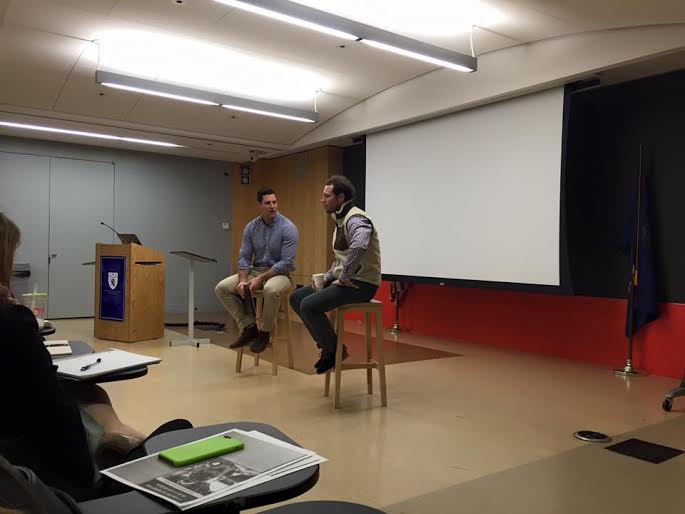Founder of Tegu, a toy company, visits King's economics class
Will Haughey, the co-founder of Tegu and former Goldman Sachs investment banker, paid a visit to Professor Brian Brenberg’s economics class on November 3. In an interview-style talk led by Brenberg, Haughey answered questions regarding entrepreneurship, profit and global needs.

“I could never fully describe how difficult it is [to start a business] and and have you really get it until you try it,” said Haughey. He reminded the audience that the stories of entrepreneurship that are usually being told are the extraordinary success stories, not the stories of failure, which are much more common. Even with his company’s success, he spoke about what he calls “the dark side of entrepreneurship” (i.e. missing projections, financial bailouts, coming close to failure, etc.). The pressure for success is constantly weighing on the entrepreneur. Haughley admits that this pressure affected him greatly and caused him to isolate himself for the first two years while he was working tirelessly to get the business off the ground. Looking back, he regrets this and realizes now that his answer to surviving “the dark side of entrepreneurship” is twofold: through humility and through community. “I think the answer is to digest and experience the process of entrepreneurship within the context of community and to be constantly serving," said Haughey.
Humility was one of the key values Haughey mentioned. For Haughey, the process of becoming humble began during his time at Goldman Sachs when, unlike many of his entering peers, he felt incredibly undeserving and grateful for the incredible job opportunity. He saw the job as a gift rather than something he deserved. “It changed the way that I worked,” he said.
Haughey also emphasized the importance of community for the entrepreneur. There will be suffering, and it is better to suffer with others than all alone, he advised. He credits his brother Chris Haughey, the co-founder of Tegu, for pushing him to leave Goldman Sachs and help start Tegu. If it was not for members of his community, he said he would not be where he is today.
Tegu (named after Tegucigalpa, the capital of Honduras) is a toy company that uses its model to help meet social needs. They produce magnetic wooden blocks for children to play with. The company focuses on four primary values, according to its website: potential ("unlocking the creative in all of us"), goodness ("making the world better than we found it"), quality ("investing love, sweat and tears") and potential ("unlocking the creative in all of us").
Tegu also values social entrepreneurship. The company opened a factory in Honduras that employs local Hondurans. They partner with companies that fight deforestation by planting new trees, more than quadrupling the amount required to make the toys. The customer’s purchase also can help fund the education of children in Honduras.
The company manages to both generate a profit and to help others simultaneously. Haughey remarked that these ideas (social entrepreneurship and impact investing) are becoming increasingly successful. However, when Tegu came into the market over five years ago, this idea was not as widely accepted. When pitching to investors, many were confused whether Tegu was a non-profit or for-profit company because of its commitment to the fulfillment of social needs. It is definitely a for-profit. Haughey is not afraid to address this head-on. He said, “I love profit. I want profit. And I want people to profit from my profit.” Actually, surveys indicate that most people buy their product because of the product, not because of the mission attached to it.
Haughey is passionate about the development of the economy in Honduras, but above all, in human flourishing as a whole. He wants to help countries develop the entrepreneurial spirit and predominant middle class present in the United States. These two elements drive productivity and creativity in ways that are often taken for granted. Tegu is providing jobs that increase productivity and inspire creativity. Right now the focus is to sell toys so that they create jobs and support their social partnerships. However, Haughey sees great opportunity in the future to expand and shift Tegu's focus to specifically targeting new entrepreneurship in Honduras. This is a “multi-decade” goal for the company because, as stated earlier, entrepreneurship is necessary but an extremely challenging and risky endeavor.
Haughey graduated from the Indiana University with a major in finance in 2004. He went on to work at Goldman Sachs in investment banking (2004-2006) and later as a proprietary hedge fund analyst for investments (2006-2008). Haughey co-founded Tegu and acts as the CFO, secretary, chairman of the board and treasurer for the company (or as they like to call it, “Chief Blockhead”).


